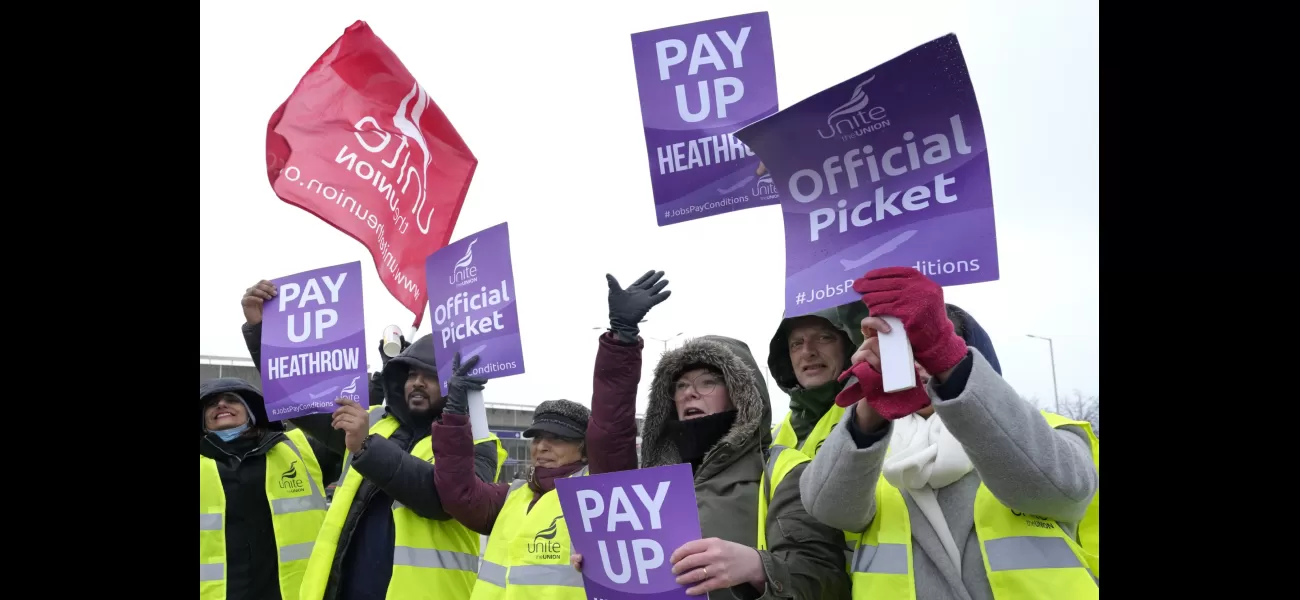Unions hold gov't responsible for a year of strikes.
Pay disputes have been caused by longest period of falling wages ever recorded.
June 18th 2023.

One year ago, on June 21, the Rail, Maritime and Transport union (RMT) initiated their first strike in a dispute over pay, jobs and conditions. Following this, there has been an unprecedented wave of walkouts across the railways, NHS, education and civil service. Union leaders are now attacking the government’s role in the various cross-industry disputes, with one official stating that they are “completely to blame”.
According to Professor Peter Turnbull of the University of Bristol Business School, the first anniversary of the strike marks an important milestone in the UK’s contemporary industrial relations history. He states that the disputes have been caused by years of austerity, work intensification and reduced standards of service provision, and that the effects of the strikes will remain for years to come.
Pat Cullen of the Royal College of Nursing has said that the level of strike action seen in the last year was unimaginable, and it has been initiated by nursing staff standing up for their patients in the face of low pay. She states that public support for nurses striking is unwavering, and that this should focus attention in Downing Street.
Mark Serwotka of the Public and Commercial Services union claims that the government is completely to blame for the strikes, as they have failed to address the cost-of-living crisis that is squeezing workers. He states that the government has made concessions to civil service unions, but only after months of action.
The train drivers’ union Aslef has also been involved in the strikes, with their members recently voting to continue taking industrial action for the next six months in order to secure a decent pay rise. Mick Whelan of Aslef states that drivers have been demonised by the government, but that the dispute is really about the fact that many drivers have not had a pay rise for four years.
It has been one year since the Rail, Maritime and Transport union (RMT) first went on strike in an attempt to improve pay, jobs, and conditions of their workers. This strike has been the catalyst for an unprecedented wave of walkouts across the railways, NHS, education, and civil service. Union officials are now blaming the government for these disputes, claiming that it is “completely to blame”.
Since the RMT’s first strike, 3.7 million working days were lost in labour disputes in the UK in the 11 months to April. This is the highest number in an 11-month period in over 30 years and the figure is expected to rise. Professor Peter Turnbull of the University of Bristol Business School commented on the significance of this first anniversary: “This marks an important milestone in the UK’s contemporary industrial relations history. More than three-quarters of the days lost came from transport, storage, information and communications, but daily life has also been affected by strikes in our schools and universities, the NHS, and civil service. After the longest period of falling real wages since records began, pay has understandably dominated the headlines, but the causes of these ongoing disputes run much deeper after years of austerity, consequent work intensification and falling standards of service provision.”
Pat Cullen, of the Royal College of Nursing, discussed the public’s opinion on their strikes: “In the last year we have seen levels of strike action that few people could have imagined, with next month marking a year since the RCN announced it would ballot its members. That ballot led to unprecedented action from nursing staff who are standing up for their patients and they will no longer tolerate the low pay that fails to attract and retain people in the profession and puts patients at risk. In the final days of our ballot for further action, new polling has shown public support for nurses striking is unwavering, with support actually rising since the eve of the first strike in December last year. Nurses are seeing that the public backs them, while the fact that public support has risen should urgently focus attention in Downing Street.”
Mark Serwotka, of the Public and Commercial Services union, also criticized the government’s role. He said, “There is no doubt that the government is completely to blame, fuelled by an unprecedented cost-of-living crisis in which workers have been squeezed like never before. Ministers have been appalling. They assumed there would not be the stomach for a fight, but they made a catastrophic mistake. The government has now made concessions to civil service unions, but only after months of action, ranging from national strikes, to targeted action in departments or areas such as the Border Force.”
Mick Whelan of the train drivers’ union Aslef also discussed the government’s role in the strikes. He said, “Drivers have been demonised by the government and some commentators are keen to highlight how much they are paid, but the point of the dispute is that many drivers have not had a pay rise for four years.”
It is clear that the past year has seen a dramatic increase in the number of strikes and industrial action, as workers attempt to fight for better pay and conditions. With public support for these strikes continuing to rise, it is clear that the government must take action to address the concerns of workers. It is only through resolution of these disputes that the UK can move forward.
According to Professor Peter Turnbull of the University of Bristol Business School, the first anniversary of the strike marks an important milestone in the UK’s contemporary industrial relations history. He states that the disputes have been caused by years of austerity, work intensification and reduced standards of service provision, and that the effects of the strikes will remain for years to come.
Pat Cullen of the Royal College of Nursing has said that the level of strike action seen in the last year was unimaginable, and it has been initiated by nursing staff standing up for their patients in the face of low pay. She states that public support for nurses striking is unwavering, and that this should focus attention in Downing Street.
Mark Serwotka of the Public and Commercial Services union claims that the government is completely to blame for the strikes, as they have failed to address the cost-of-living crisis that is squeezing workers. He states that the government has made concessions to civil service unions, but only after months of action.
The train drivers’ union Aslef has also been involved in the strikes, with their members recently voting to continue taking industrial action for the next six months in order to secure a decent pay rise. Mick Whelan of Aslef states that drivers have been demonised by the government, but that the dispute is really about the fact that many drivers have not had a pay rise for four years.
It has been one year since the Rail, Maritime and Transport union (RMT) first went on strike in an attempt to improve pay, jobs, and conditions of their workers. This strike has been the catalyst for an unprecedented wave of walkouts across the railways, NHS, education, and civil service. Union officials are now blaming the government for these disputes, claiming that it is “completely to blame”.
Since the RMT’s first strike, 3.7 million working days were lost in labour disputes in the UK in the 11 months to April. This is the highest number in an 11-month period in over 30 years and the figure is expected to rise. Professor Peter Turnbull of the University of Bristol Business School commented on the significance of this first anniversary: “This marks an important milestone in the UK’s contemporary industrial relations history. More than three-quarters of the days lost came from transport, storage, information and communications, but daily life has also been affected by strikes in our schools and universities, the NHS, and civil service. After the longest period of falling real wages since records began, pay has understandably dominated the headlines, but the causes of these ongoing disputes run much deeper after years of austerity, consequent work intensification and falling standards of service provision.”
Pat Cullen, of the Royal College of Nursing, discussed the public’s opinion on their strikes: “In the last year we have seen levels of strike action that few people could have imagined, with next month marking a year since the RCN announced it would ballot its members. That ballot led to unprecedented action from nursing staff who are standing up for their patients and they will no longer tolerate the low pay that fails to attract and retain people in the profession and puts patients at risk. In the final days of our ballot for further action, new polling has shown public support for nurses striking is unwavering, with support actually rising since the eve of the first strike in December last year. Nurses are seeing that the public backs them, while the fact that public support has risen should urgently focus attention in Downing Street.”
Mark Serwotka, of the Public and Commercial Services union, also criticized the government’s role. He said, “There is no doubt that the government is completely to blame, fuelled by an unprecedented cost-of-living crisis in which workers have been squeezed like never before. Ministers have been appalling. They assumed there would not be the stomach for a fight, but they made a catastrophic mistake. The government has now made concessions to civil service unions, but only after months of action, ranging from national strikes, to targeted action in departments or areas such as the Border Force.”
Mick Whelan of the train drivers’ union Aslef also discussed the government’s role in the strikes. He said, “Drivers have been demonised by the government and some commentators are keen to highlight how much they are paid, but the point of the dispute is that many drivers have not had a pay rise for four years.”
It is clear that the past year has seen a dramatic increase in the number of strikes and industrial action, as workers attempt to fight for better pay and conditions. With public support for these strikes continuing to rise, it is clear that the government must take action to address the concerns of workers. It is only through resolution of these disputes that the UK can move forward.
[This article has been trending online recently and has been generated with AI. Your feed is customized.]
[Generative AI is experimental.]
0
0
Submit Comment





